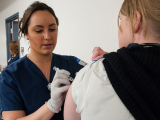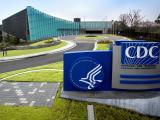Jan 18, 2011 (CIDRAP News) – In opening the World Health Organization's (WHO's) executive board meeting yesterday, the head of the WHO cited anti-vaccine sentiments as a worrisome trend that may be very difficult to change.
Noting that some countries are continuing to see severe cases of 2009 H1N1 infection in relatively young people, WHO Director-General Margaret Chan said, "In some cases, persuading the public to seek vaccination has become even more problematic than during the pandemic. As documented in the report on immunization, the problem of public mistrust extends well beyond influenza vaccines."
Chan didn't cite specific countries in her prepared speech, but the United Kingdom is one where the uptake of seasonal flu vaccine early this season was described as low, though demand has increased in recent weeks in line with flu activity. In the 2009 H1N1 flu pandemic, a good share of the doses ordered by many countries went unused, in part because the pandemic had already peaked by the time the vaccine became plentiful.
"We may need to accept the fact that public perceptions about vaccine safety can be permanently changed by unfounded fears, to an extent that no amount of evidence can change the public's mind," Chan said. "This is a worrisome new trend that needs to be addressed."
The board meeting, which will continue until Jan 25, is the main session of 2011 for the WHO's 34-member group of experts. The panel is scheduled to consider a long list of reports on topics that include pandemic flu preparedness and the sharing of flu viruses and access to vaccines, implementation of the International Health Regulations, the WHO's global immunization vision and strategy, the fate of remaining smallpox virus stocks, and control of cholera and malaria, among others.
Chan noted that a committee of experts commissioned by the WHO is reviewing the agency's performance during the H1N1 pandemic and will submit its report to the World Health Assembly, the annual meeting of WHO member countries, in May.
She remarked that the pandemic simultaneously pointed up weaknesses in health services and inequities in access to "commodities" and confirmed the value of preparedness.
In other comments, Chan said the global public health agenda has become more and more complex, with the result that the WHO is "over-extended" and needs to make some changes to cope with its burdens.
"We are not functioning at the level of top performance that is increasingly needed, and expected," she said. After mentioning WHO initiatives on several fronts, including meningitis in Africa and polio worldwide, she added, "From the review of events I have just provided, I think we can conclude that WHO is effective, sometimes strikingly so, in some areas. But this is not the case in all the areas covered by our vast programme of work.
"WHO needs to change at the administrative, budgetary, and programmatic levels. We do not need to change the Constitution, but we do need to undergo some far-reaching reforms."
She did not go into details on what changes are needed. But she cited two approaches that can help the WHO and individual nations cope with the "overwhelming" public health demands they face.
First, she said, "National health strategies and plans are one way to achieve better alignment with national priorities and reduce some of the demands, duplication, and fragmentation. Support for this approach requires changes in the way WHO country offices function and in the way their staff are recruited and trained. It also requires changes in the behaviour of partners and donors as they work to support health development in countries."
A second approach is through strong technical leadership by the WHO, she said, citing the Stop TB Strategy as a good example. "The strategy has a plan, with budgeted activities, a strong partnership, and strong technical guidance from WHO," she observed, adding that the WHO's recent endorsement of a new and faster tuberculosis test triggered a 75% price reduction for developing countries.
Chan also asserted that the level of WHO involvement in fighting a public health problem should not be determined by the problem's magnitude but by how much of an impact the agency can make. "Others may be positioned to do a better job," she said.
See also:
Jan 17 Chan speech
http://www.who.int/dg/speeches/2011/eb_20110117/en/index.html#
WHO executive board meeting page
http://www.who.int/mediacentre/events/2011/eb128/en/index.html
WHO executive board agenda
http://apps.who.int/gb/ebwha/pdf_files/EB128/B128_1-en.pdf




















